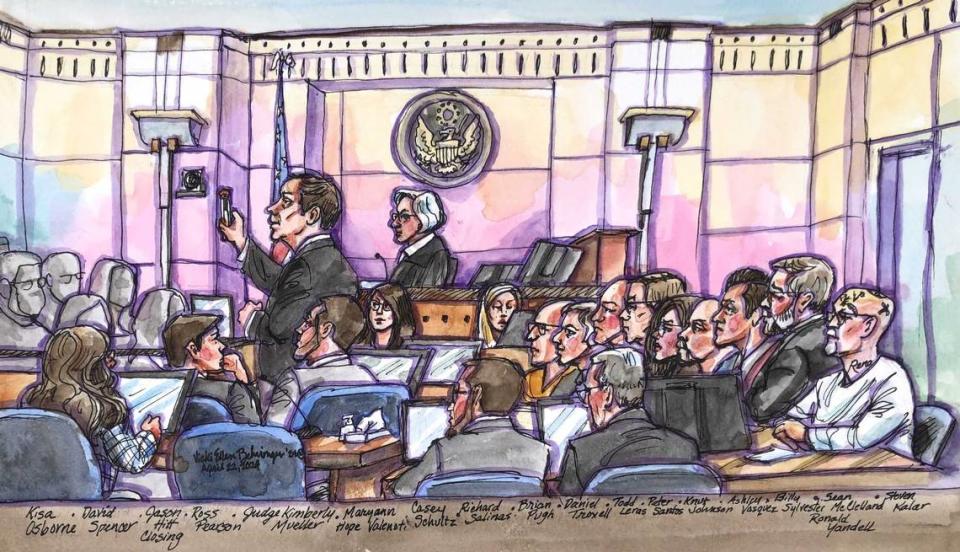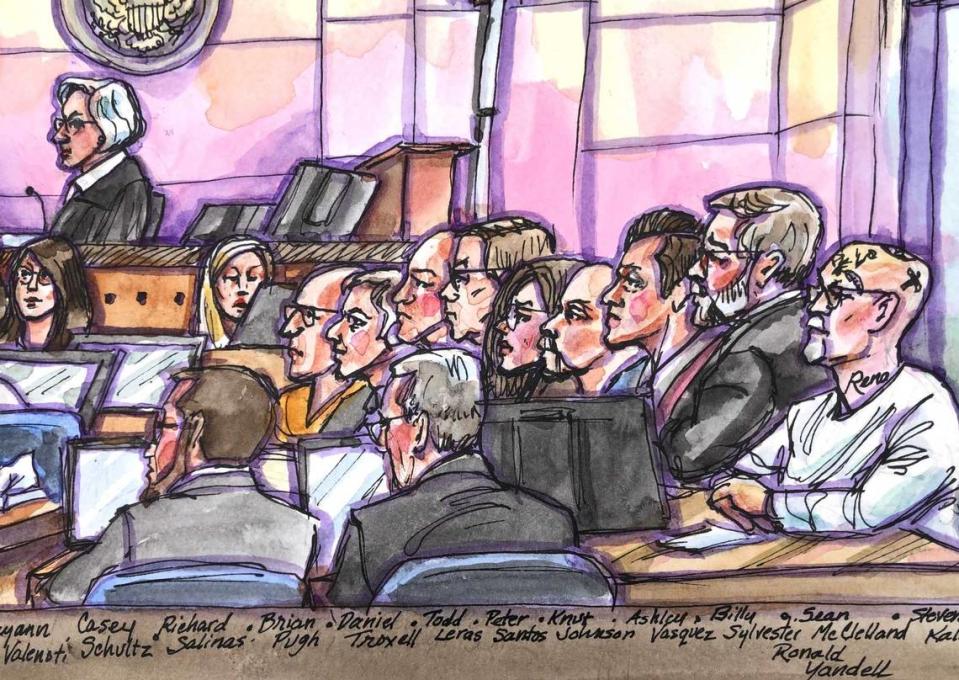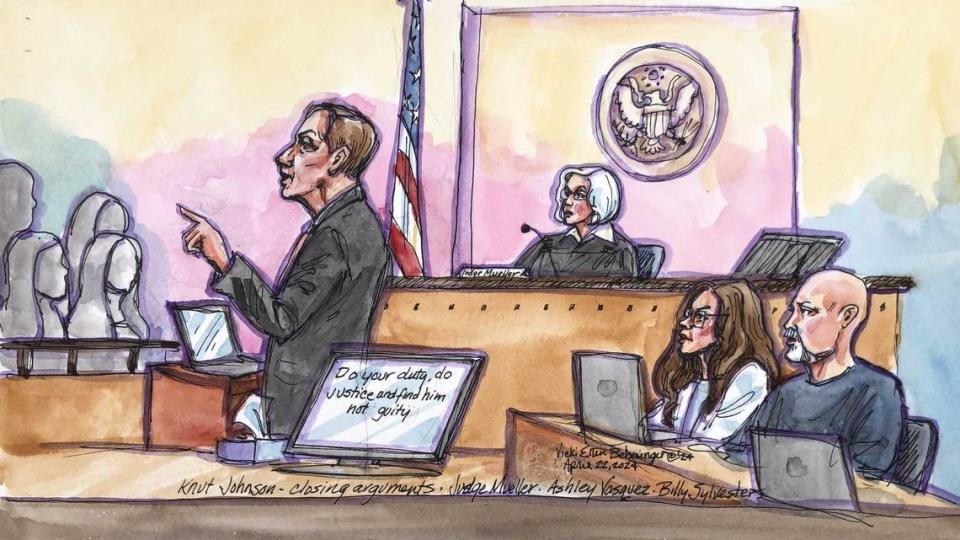Aryan Brotherhood prison gang case heads to jury after weeks of trial in Sacramento court
Staring at the jury on the 16th floor of Sacramento’s federal courthouse downtown this week, Assistant U.S. Attorney Jason Hitt held up the knife used by inmate William Sylvester to kill another prisoner, a slaying Hitt said was done to gain entry to the Aryan Brotherhood prison gang.
“This is the knife he used to kill that man in cold blood,” Hitt said of the Oct. 7, 2011, attack at California State Prison, Sacramento, that left inmate Ronald Richardson dead from 31 stab wounds. “He killed Richardson to earn his ‘rock.’”
The rock, in this case, is a shamrock tattoo that prosecutors say symbolizes membership in the California prison gang, which has been the focus of a trial that began in February against Sylvester and two other defendants accused in a racketeering, drug and murder conspiracy case that investigators have been building since 2016.
Prosecutors say the case shows how the prison gang had the power to order hits on inmates inside California prisons as well as targets outside of prison, and evidence shown in court has included extremely graphic prison video and photos of inmate murders.

Sylvester and fellow inmates Ronald Yandell and Danny Troxell have been sitting in court under tight security for weeks as prosecutors have tutored jury members on the peculiar phrases the gang used in phone conversations captured on wiretaps — “in the hat,” for an inmate marked for death; “on the shelf” for one no longer politically active in gang affairs.
“They have proudly adorned themselves with the shamrock, the feared symbol that only belongs to Aryan Brotherhood members,” Hitt said during closing arguments in the case Monday.
Since the trial began, Hitt and fellow prosecutors Ross Pearson and David Spencer have brought forth a parade of witnesses that include former AB followers and inmates who have agreed to cooperate with the government against what Hitt called “a most feared, vicious and violent gang” that unleashed a crime wave using contraband cellphones.
The case is expected to go to the jury on Wednesday to begin deliberations on the charges against the three, who already are serving life sentences in state prison and escaped the possibility of a death penalty prosecution when the Justice Department ruled it out last October.
Defense attorneys for the three defendants argued to the jury this week that prosecutors have put together a weak case that includes lost evidence, lies from witnesses and a lead Drug Enforcement Administration agent “who will say anything, who will do anything to reach the goal of conviction.”
Sylvester’s attorney, Knut Johnson, was the first to make that claim during two days of closing arguments this week, telling the jury that Sylvester’s slaying of Richardson had nothing to do with wanting to ingratiate himself with AB leadership.
“This is not about whether he did it, but why he did it,” Johnson told jurors. “He did so because that’s what prisoners do to suspected child molesters, not to get into the Aryan Brotherhood...
“He’s not on trial for killing Richardson because he did kill Richardson. He was convicted in state court.”

Troxell attorney Todd Leras painted his client as a peacemaker who helped lead a hunger strike at Pelican Bay State Prison that led to reforms against the use of solitary confinement and helped forge an inmate pact against racial violence among inmates known as the “agreement to end all hostilities.”
“The government has failed to sustain its burden of proof,” Leras said Tuesday. It has not proved beyond a reasonable doubt that Danny Troxell was one of the people tearing things down.”
And Yandell attorney Steven Kalar attacked the prosecution as the brainchild of lead DEA Agent Brian Nehring, the man he called “the star agent.”
“He’s the guy who started this whole case,” Kalar told jurors. “He’s the guy who started this whole investigation, and the evidence shows that Agent Nehring has a difficult relationship with the truth.”
Kalar’s assault on Nehring included a last-minute move Friday to get the case thrown out, or at least delayed while an evidentiary hearing was set, because of what Yandell’s lawyers wrote was an “explicitly vindictive motive” by the lead case agent.
Yandell’s attorneys filed a motion seeking dismissal of the case based on an email from Nehring to Hitt that court documents say was sent Feb. 5, 2016.
In the email, which the defense says was first disclosed to them on April 11, Nehring writes about learning that Yandell was one of the leaders of a hunger strike at Pelican Bay State Prison in 2013 aimed at ending solitary confinement in the California prison system.
“I want to crush him so bad, my teeth hurt,” Nehring, who wrote the original 143-page criminal complaint that led to the indictment of the defendants, wrote to the prosecutor.
“This is direct evidence of vindictiveness,” Yandell’s attorneys wrote in their motion. “The lead case agent (and complaint writer) identifies that Mr. Yandell led constitutionally-protected hunger strikes.
“Then the lead case agent expresses that he wants to ‘crush’ Mr. Yandell for doing so. That direct connection between Mr. Yandell’s First Amendment activity and the prosecution’s punitive motive — expressed in back-to-back, linked sentences — satisfies the admittedly stringent burden for finding direct evidence of vindictiveness.”
Nehring’s sentiments “provide (at least) a reasonable likelihood that this prosecution is designed to punish Mr. Yandell for his reform efforts,” Yandell’s attorneys wrote, adding that Yandell and other defendants “have long faced institutional retaliation” for their reform efforts.
“Because of their efforts, prison officials have demonized them, discredited them, used confidential information to return them to solitary, moved them in facilities with solitary-like conditions, and denied them parole. ...” the motion states.
“This case promises to remove Mr. Yandell and other defendants from the state prison system they helped reform. And it promises to put them back in solitary confinement — likely at ADX Florence in Colorado,” the so-called Supermax federal prison that once held Unabomber Ted Kaczynski.

Sylvester’s attorneys joined in the motion in a document filed Tuesday. Prosecutors have yet to reply to the motion, which is similar to a January motion seeking to toss the case out over “vindictive prosecution.”
Chief U.S. District Judge Kimberly J. Mueller denied that motion days before trial began.
The closing arguments began on the 32nd day of a trial that has been marked by tight security inside the courtroom and tensions that spilled out into the open at least once.
Last month, an incident in court led to a discussion outside the presence of the jury after a representative of the U.S. Marshals Service told the judge that at the close of one court session he heard Yandell calling Troxell attorney Leras “a rat.”
“It was very quick,” the marshal’s representative told the judge, according to a transcript of the session. “And at first when it was happening I wasn’t sure which one it was directed to because there was a cluster of attorneys, and then after realizing it was directed to Mr. Leras.”
The same day, as the defendants were being taken in a van back to the Sacramento County Jail next door to the courthouse, emotions “went from zero to 10 about that fast, and shouting arguments between — it was definitely Yandell and Troxell,” the Marshals representative said.
“It was so loud I couldn’t tell, Sylvester might have been a part of it too. I’m not sure if it was everybody. And so, ‘I’m going to kill you. I’m going to f------ kill you. You’re a rat.’ All sorts of expletives.”
The incident continued at its high pitch for 20 to 25 minutes, with the three inmates separated in the van so they could not get at each other.
“It’s all verbal. But like I said, if they were to be any closer and able to have their hands free it would be a huge catastrophe waiting to happen. So that’s my concern. As well as in speaking with the (prison) staff and their handling with them, they - from their experience, in talking with them as well, is that their expectation is something is going to happen in the courtroom.”
Kalar said during the hearing he heard Yandell insult Leras, and told the judge he heard Leras reply, “At least I’m not a rat,” something Kalar said raised “the temperature a thousand degrees.”
“Because, of course, there is no greater insult for a defendant than to be accused of being a snitch,” Kalar said. “And Mr. Leras stating that to my client was jaw-dropping.”
Leras told the judge that he spoke to Yandell “in a moment of temper” after Yandell called him “a f------ piece of s---.”
The hearing ended with Mueller deciding against having the defendants fully shackled in court after she asked each of them to promise not to be disrespectful toward anyone else in court and they did.
“I give you my word, your honor,” Yandell said.

